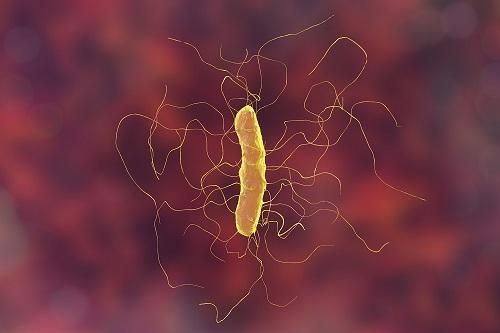
New research suggests the sympathetic nervous system (SNS) or flight or fight response can shape the severity of C difficile infection. In an animal study, a group of investigators found if they disrupted specific receptor activity in the sympathetic nervous system, a significant reduction in both intestinal inflammation and mortality was seen.1
The affected portion of the SNS is the alpha 2-adrenergic receptors (α2-ARs) which are cell surface-based, and play a role in fight or flight responses including blood pressure, anxiety and stress, and inflammation.2,3
“The discovery of the α2AR as a major driver of disease was somewhat unexpected, considering that the α2AR is a well-known negative regulator of sympathetic activity,” the investigators wrote in their study, which was published in Cell Reports Medicine.1
“Neurons are the first responders that coordinate defenses against toxic attacks. Sometimes those responders don’t recruit the right size and kind of artillery and that can make things worse,” said study author David Tyus, PhD, a neuroscience graduate student at UVA, in a news release. “Interestingly, the receptor we identified as important in C difficile infection [the alpha 2 adrenergic receptor] has also been linked to irritable bowel syndrome.4
Tyus and investigator William A. Petri Jr., MD, PhD, of the University of Virginia’s (UVA) Health’s Division of Infectious Diseases and International Health, evaluated the role of SNS in C diff progression.
In an interview with Contagion they explain that blockade of specific receptors such as alpha 2-adrenergic receptors downstream may stop disease progression of C difficile.
Contagion spoke to Tyus and Petri about how therapies addressing the sympathetic nervous system’s response may be involved in infection progression, and some of the other important aspects of their research.
Contagion: Can you explain the concept of using therapies to quiet the “fight or flight” response to potentially prevent a severe case of C difficile?
Petri and Tyus: Our results suggest that sympathetic nervous system activity contributes to the severity of disease in C difficile infection. Part of that determination was observing that blockade of specific receptors downstream of the sympathetic nervous system could curb disease progression C difficile infected mice. Theoretically, receptor blockade in patients could do the same but further study is needed to determine whether this approach could be safely applied prophylactically or after symptoms occur.
Contagion: What are the important takeaways from your study?
Petri and Tyus:The biggest takeaway from the study is that the sympathetic nervous system seems to be an important part of the disease process when one is infected with C difficile. With the backdrop of many studies in the field focusing on barrier and immune functions, this study is a new example of neuronal contributions to C difficile infection pathology.
Contagion: What would you like to see in terms of next steps for your research?
Petri and Tyus: We would like to determine which cells downstream of the sympathetic nervous system mediate its effects in the hopes of finding more resolved mechanisms and therapeutic targets. Additionally, we would like to test the role of the sympathetic nervous system in recurrent disease, a hallmark issue of C difficile infection.
Looking at Infection Recurrence
There are a number of reasons to study recurrent infection, including the possibility of a patient’s diminished quality of life as well as mortality. Factors such as advanced age, use of antibiotics, gastric acid suppression, and infection with a hypervirulance are some reasons people infected have more severe bouts or even recurrence with C difficile.5
“We are very excited to think about how our findings translate to clinic and how the sympathetic nervous system might play a role in recurrent infection. I hope that this study sets the foundation for future findings of how neurons affect the course of C difficile infection outcomes,” Petri said in a news release. 4






